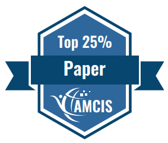IS in Education, IS Curriculum & Teaching Cases (SIG ED)
Loading...
Paper Type
ERF
Paper Number
1249
Description
MOOCs see exponential growth during the COVID-19 pandemic. This study aims to investigate the factors influencing the success of MOOCs. We apply the learning model and map in-platform information into three categories: presage, process, and product. We propose that the factors related to learners, instructors, courses, platforms, and learning activities influence completion rate and course evaluation. We analyze in-platform information about 1,000 business analytics courses from Udemy. We find that learners consider price when evaluating courses, but they are not motivated to complete courses by price. Instructors could increase the completion rate by providing short videos and posting regular assignments. Also, people enroll in MOOCs to learn emerging knowledge, not common skills. This study enriches the understanding of learners’ behavior in MOOCs environment by elaborating on the relationship between in-platform factors and the success of MOOCs. The findings provide practical implications on information management in digital learning platforms.
Recommended Citation
Wang, Ying and Song, Jaeki, "What Makes a Massive Open Online Courses (MOOCs) Excellent? An Investigation in Business Analytics Courses" (2021). AMCIS 2021 Proceedings. 4.
https://aisel.aisnet.org/amcis2021/is_education/sig_education/4
What Makes a Massive Open Online Courses (MOOCs) Excellent? An Investigation in Business Analytics Courses
MOOCs see exponential growth during the COVID-19 pandemic. This study aims to investigate the factors influencing the success of MOOCs. We apply the learning model and map in-platform information into three categories: presage, process, and product. We propose that the factors related to learners, instructors, courses, platforms, and learning activities influence completion rate and course evaluation. We analyze in-platform information about 1,000 business analytics courses from Udemy. We find that learners consider price when evaluating courses, but they are not motivated to complete courses by price. Instructors could increase the completion rate by providing short videos and posting regular assignments. Also, people enroll in MOOCs to learn emerging knowledge, not common skills. This study enriches the understanding of learners’ behavior in MOOCs environment by elaborating on the relationship between in-platform factors and the success of MOOCs. The findings provide practical implications on information management in digital learning platforms.
When commenting on articles, please be friendly, welcoming, respectful and abide by the AIS eLibrary Discussion Thread Code of Conduct posted here.



